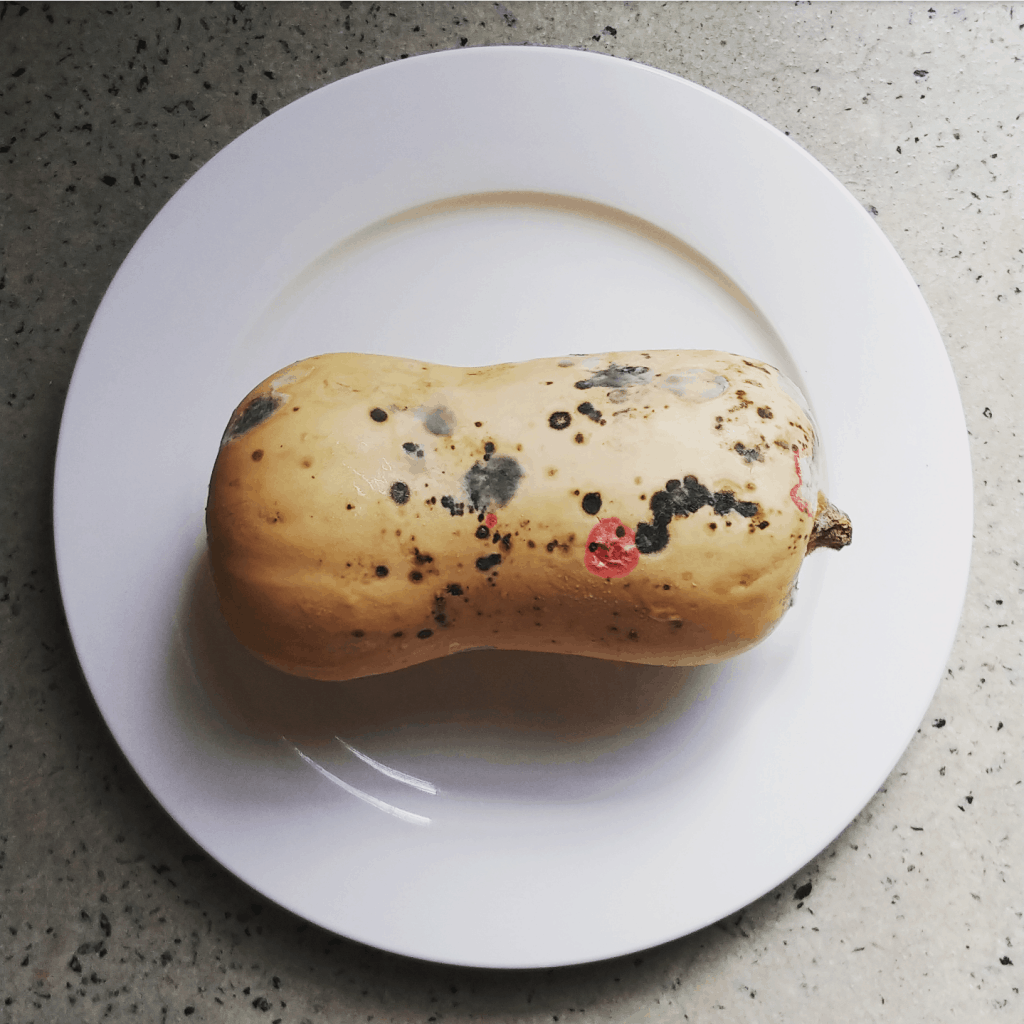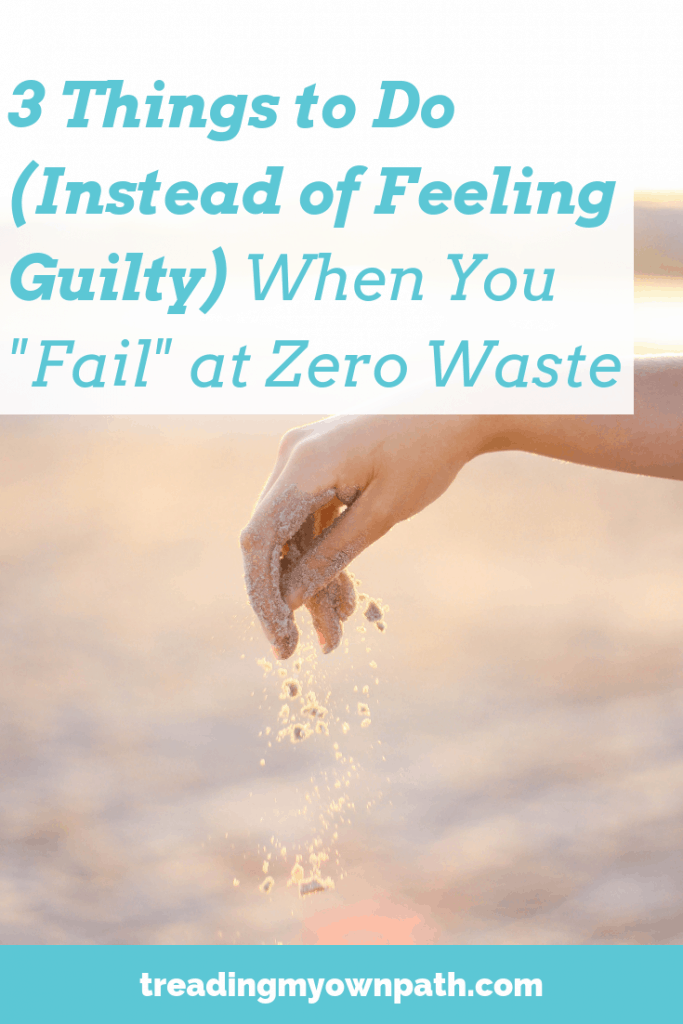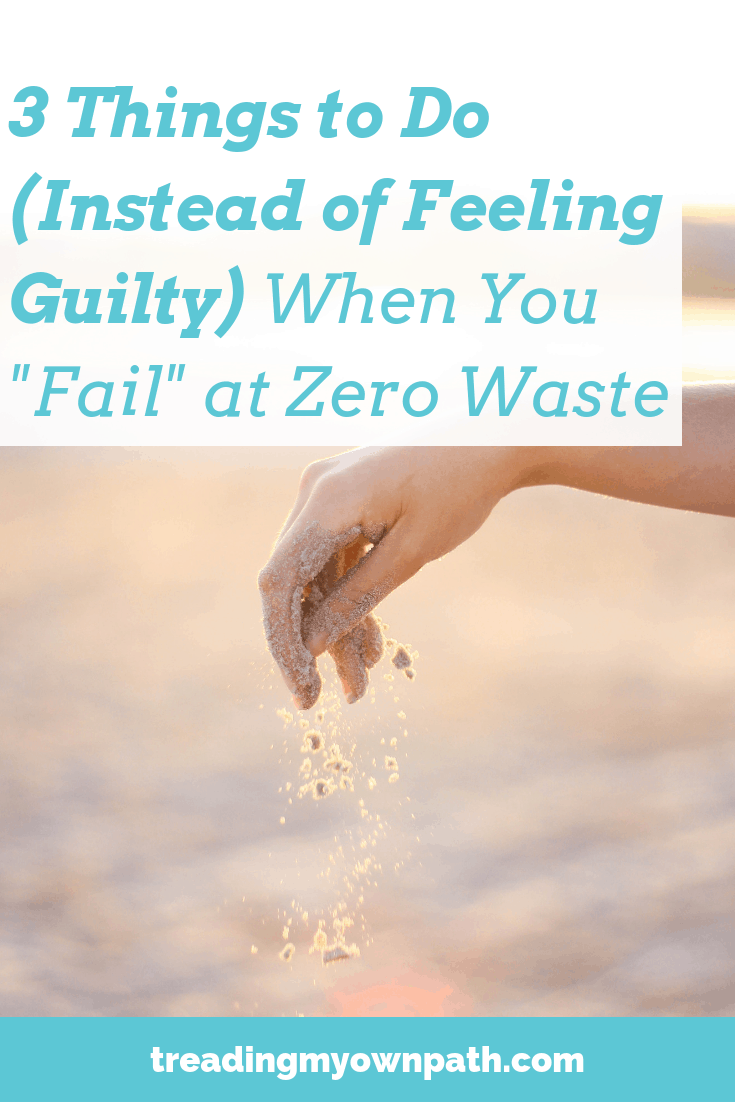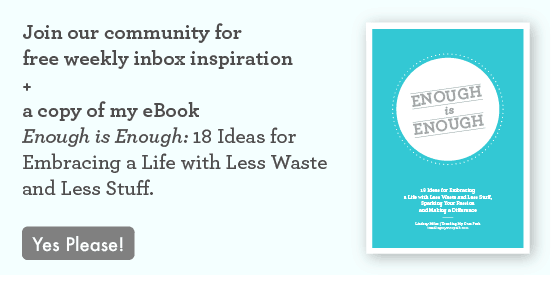3 Things to Do (Instead of Feeling Guilty) When You “Fail” at Zero Waste
Let me tell you a story about a butternut squash that I found in the fridge. Well, I didn’t find it exactly, because I knew it was there, underneath the silverbeet in the crisper drawer.
Before you tell me that butternut – and other varieties of – squash/pumpkin shouldn’t actually be stored in the fridge, but at room temperature, I’m going to put my hand up and say, yep, I know this.
But it was in the fridge nonetheless.
I suspect what happened was, the veg box arrived, it sat on the side glowering at me for a few hours, and then I decided I’d had enough and piled everything in the crisper/fridge as quickly as possible.
Just because we know what it the best or correct thing to do, doesn’t mean we always do it!
And probably, the fact that it was in the fridge was the reason for what happened next.
Because one day I opened the fridge, and I saw this.
If you hate seeing waste, look away now.

And yes, when I say “one day” I literally mean that I somehow didn’t notice it getting to this point. Clearly it didn’t go like this overnight; but I saw nothing until I opened the fridge and was confronted with this spoiled, rotten and disheveled-looking pumpkin.
And oh, let me tell you about the guilt that followed!
Because I hate waste.
Because I do not identify myself as someone who wastes stuff – so I shouldn’t be wasting stuff, right?
Because I’m organized and I know what’s in my fridge and I don’t let stuff go bad. Except…
Because a farmer went to the effort of growing that pumpkin (and it was organic! Double demerits for me) and then a business went to the effort of sourcing and selling that pumpkin to me. It feels very disrespectful of me to be wasting all that effort.
I have expectations of myself around the way I do things, and I fell short.
Now I’m no stranger to eco-guilt. I think all of us have experienced eco-guilt at some point. When we forget to refuse the plastic straw perhaps, or when we realise the thing we’ve putting in the recycling bin for the last decade is actually not recycable at all.
Basically, if we are not doing everything perfectly all of the time when it comes to trying to live sustainably, there will probably be guilt.
Newsflash – no-one actually does all things perfectly all of the time.
We need time to get those habits ingrained. Sometimes we mess up, sometimes we forget. As beginners it’s easier to forgive ourselves as we are still learning.
But messing up isn’t always limited to beginners. I’ve been conscious of reducing my waste for years now, but that doesn’t mean I don’t mess up! Being more practiced or experienced doesn’t mean slip-ups don’t happen. When they do, I, for one, feel pretty guilty about it.
But the thing about guilt, is that we can deal with it in one of two ways.
We can allow it to crumple us until we feel defeated and like it’s all too hard and what’s the point in trying anyway…
…Or we can take that energy and use it to power our next choice, our next action, and our next commitment.
Let me tell you, the latter option feels infinitely better than the first option.
Dealing with my environmental guilt is something I’m learning how to do. I don’t want to be the person crumpled in a heap, I want to be the one getting back up and dusting myself off.
That doesn’t mean I don’t feel guilty, but it means I try not to stay feeling guilty for too long.
Here’s some things I do to turn that guilt into useful action.

1. Remind myself that I’m not perfect, but also that I never said I was, that I actually will never be, and forgive myself for being human.
This should be obvious but I think sometimes we forget that we’re humans, and humans mess up sometimes. I know I do. I know that no-one is perfect but I do set high expectations for myself.
I think that’s okay, but there still needs to be room for error.
So yeah, I didn’t mean to let that pumpkin go to waste. But it happened. I guess I won’t be winning the “zero waste perfection” award this year, but I’m okay with that.
2. Ask myself, what can I learn from this?
Most of my eco-guilt comes from falling short of the standards I set for myself. I think it’s useful then, to have a good look at what happened and why I’m feeling guilty now.
I definitely think that I can get complacent around not creating waste. thinking to myself, I’ve been doing this for so long now that of course I won’t waste anything!
So it’s actually useful to get a reality check. There’s always work to do, it’s easy to slip up when we’re not paying attention.
I had a think about why it happened (I shouldn’t have stored that pumpkin in the fridge, I should have kept a closer eye on what was in the fridge) and resolved to do things differently next time.
I can’t change the past, but I have the opportunity to do things differently in future.
3. Choose something to DO to channel that frustration and guilt into useful action.
Forgiveness and reflection are important, but action is better! That energy has to go somewhere, so why not channel it into something useful?
Here’s some ideas:
- Talk about the “fail” with others. (Just like this!) We all want to share the wins and successes, but talking about failures is equally important. Change is never a straight line, and it’s helpful to others on the journey to see that it’s a zig-zag, not a perfect arc.
- Share solutions. For example, this got me thinking – I wonder how many people know how to store food correctly? And how many people end up throwing things away prematurely simply because they stored the thing wrong? I’m adding this to my list of future blog posts. That way I can use my mistake to help others choose better.
- Make your voice heard. Write to companies, manufacturers and businesses to discuss the issues and share solutions. This isn’t relevant to my situation here as I accept 100% of the blame. But say you ordered something and it arrived wrapped in plastic because you forgot to ask about the packaging, or you were given a straw because you forgot to say “no straw”. You can own your part whilst still reaching out to the business to explain and ask them to do better.
- Make a change. Forgiveness and reflection are two parts, the third part is doing things differently next time. Whether that’s tweaking our routine, or setting up a reminder, or investing in the tools to do things differently, we need to use this guilt to fuel a new way of doing things.
- Join a group of others taking action. Maybe it’s picking up litter, or making reusable shopping bags, or writing letters; maybe it’s a group of like-minded people getting together to share ideas… But finding a group that’s bigger than you can help channel some of your energy into creating more systemic change.
I don’t know if we can get rid of guilt altogether. Maybe a little bit of guilt is a good thing. It shows we have an awareness of the impact of our actions. I find that feeling a little bit guilty reminds me that these are things that I care about; issues that I care about.
Used right, we can channel our guilt to take action rather than letting it overwhelm us, and do better next time.
Now I’d love to hear from you! Do you suffer from eco-guilt? Is there anything that makes you feel particularly guilty? How have you learned from it, and how do you try to manage it? or do you not have a guilty bone in your body? In which case – tell us your secrets! Wherever you sit on the scale I’d love to hear your thoughts so please share in the comments below!








Hi Lindsay – urgh! I feel your pain! Food waste is my worst nightmare and I pride myself on not doing it! But as you say, we are all human…
There must be some weirdo moulds in Perth at the moment – I had a whole kent pumpkin sitting in my kitchen for a few weeks (not in the fridge) and when I finally cut it open yesterday the whole inside was furry with grey mould! I rescued what I could and roasted anything that was salvageable, but it was so strange as the outside looked perfectly normal!
Cheers, Sally at One Family, One Planet blog
Yes I too pride myself on not wasting food Sally, and it was a fall from grace for me! Pride comes before a fall ;) That is the worst, when you cut something open to find the inside has gone mouldy. Not had that with a pumpkin but did have that with a passionfruit the other day. Wasn’t too worried though as I had about 15 of them, and it was just one. Plus that was nature’s fault, not mine!
Perfect timing on this post Lindsay :) I didn’t know you shouldn’t store butternut pumpkin in the fridge. I have a cut one in there now actually. Although I’m pretty good at knowing how to store different types of foods, I often find that I do store some things incorrectly. I read an FB post a few years ago about not storing Nectarines in the fridge (which I had always done) as they don’t do well in cold storage. A blog post on how to store foods properly would be an excellent resource.
I frequently feel guilty over how much food we waste. There are various reasons it happens and we are working on NOT doing it.
I love the 3 things we CAN do. I’m constantly reminding myself that we’re human and we aren’t meant to be perfect. In fact, I’ve thought for a long time that the definition of human should be “Imperfect Being”. I really like the idea of sharing our successes and failures and asking questions about what others do to deal with them. Maybe it can help people see that everyone makes mistakes and if we learn from it, it wasn’t a failure at all. It was a lesson learned simply by living life.
Hi Peta! I think cut vegetables is slightly different, although I actually think a cut pumpkin would be fine outside the fridge, I would refrigerate it. I don’t bother covering the ends though. Yes it would be a good post, there’s always something to learn!
It’s reassuring to realise that people aren’t perfect (even though we know that!) and of course it’s easy with social media just to present the best/good bits. But there’s lots to be said for sharing the bad bits, too!
Thanks for sharing your humanness Lindsay! Being a zero waste personality has its pressures! Peta, I think cut pumpkin does belong in the fridge, it’s the whole pumpkins that store best in a dry slightly warmer place. I recently found this site that is very specific about whether you can eat less-than-perfect food or not: https://www.eatortoss.com/
Thank you so much for that link Rachel :) I’ll definitely check it out :)
“Eco guilt” – this is so a thing! My kids have told me off when I’ve forgotten to refuse straws before. But yes, no one is perfect and mistakes happen. I think that’s how you grow.
PS – I was waiting to hear what happened to the pumpkin!!
I never knew not to store a butternut in the fridge. I kept pumpkins on the side as my teens decided it was not on their schedule to carve last November. They looked pretty so stayed there way into the New Year too. Recipes for pumpkin soup and pie were looked at but no one took action. Eventually the base went soggy and I put in the compost bin. Delighted to see the compost worms soon enjoying it. So contributing to making compost and not totally wasted. Maybe the concept of waste has different I interpretations? My guinea pigs and dog eat veg scraps and bits of left overs all living long healthy lives away from.commercial foods full of chemicals. The birds finish scraps too. So we have a diverse group of feathered friends visit us every day I try not to waste but with 3 teens obsessed by sell by dates it isn’t always easy.
Shame on you for wasting that pumpkin. (Only joking) I have been writing letters to companies about packaging. I try to do one ot two a week. If you wanted to start a zero waste action group, I would be interested. We could campaign for change together.
Great thoughts on how to deal with guilt. I feel it all the time. The fact I’m not zero waste yet, when I am too tired to pick up garbage on my walk. Enviro guilt and Enviro anxiety are with me a lot. I’ve realized that action has to be the next step. Try better and get involved. Not much more we can do.
I food the same with a papaya this week :( if I can at least feed it to the chickens or worm farm its not a total waste…. yep learn from it and move on!
Eco-guilt.. I bet most of us face it more often than not, but people don’t usually openly discuss about it. Social media capitalizes on zero waste successes but fails to show the other side of the story. We need to learn to own our mistakes without getting hung up on them.
P.S. Really looking forward to a guide on storing foods.
Wow really good blog, very inspirational. We should raise awareness of reducing, recycling our waste, not just that also we should look at other things like how we use water, electricity.
personal story happened last week when our toilet flush stopped working and I realized how much water we actually waste every time we flush water down the drain.
Lets strive to make our motto of 2019 in London: Reuse – Recycle – Reduce.
Thanks is very good talk abaut eco-guilty.
I feel guilty when I still be given plastic straw though I said NO need plastic straw. Guess it isn’t a thing yet in my country and it did ruined up the mood a little bit. Well, to the eco-brick did the straw goes.